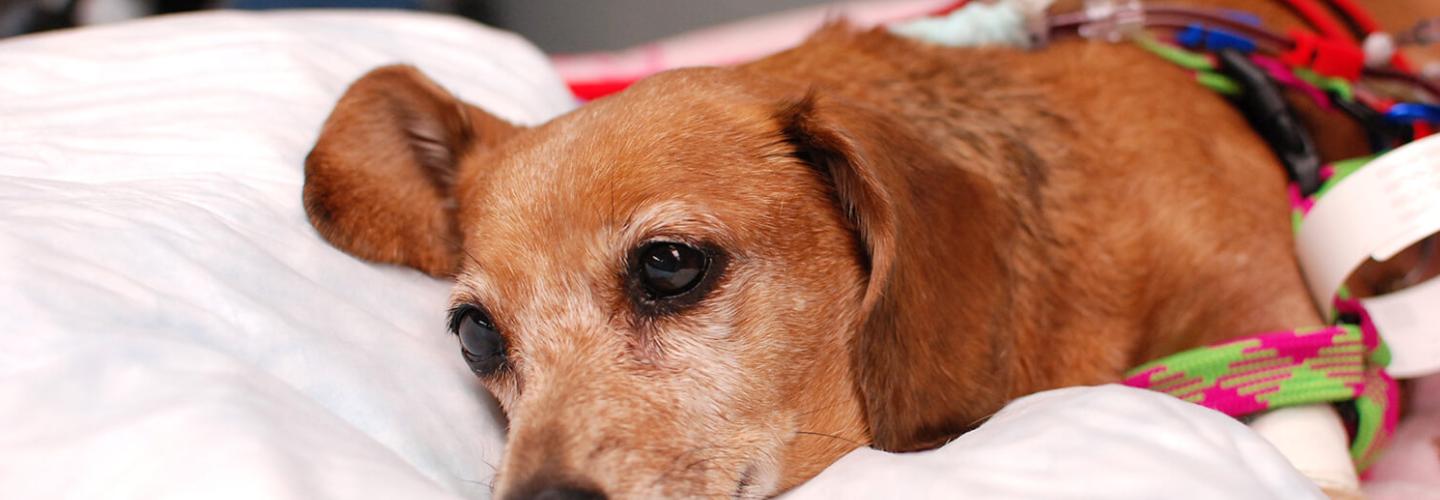
Internal Medicine
What we do
Internists, or internal medicine specialists, are experts in the diagnosis and treatment of conditions that affect the vital organs. That includes the respiratory system, digestive system, liver and pancreas, endocrine system, urinary system, and immune system as well as infectious diseases, among others. Your veterinarian would refer your pet to us because they might need specialized expertise.
Our Services
Symptoms and Diagnosis
Here is a comprehensive list of symptoms/problems and diseases we typically treat, as well as common procedures we conduct in Internal Medicine.
Respiratory
If your pet is having trouble breathing, please seek emergency veterinary care.
- Some symptoms of respiratory disease
- Coughing
- Sneezing
- Nasal discharge (mucus, snot, phlegm, etc.), bloody nose
- Excessive panting
- Exercise intolerance
Diseases
- Rhinitis (nasal inflammation)
- Tracheal collapse
- Bronchitis
- Asthma
- Pneumonia
- Pulmonary fibrosis
Gastrointestinal
Gastrointestinal problems can be seen with diseases in the gastrointestinal tract, or signify diseases outside of the GI tract.
- Trouble swallowing
- Regurgitation
- Vomiting
- Diarrhea
- Increased stomach growling/noises
- Picky/finicky or decreased appetite
- Increased appetite
- Bloody stool
- Abnormally colored stool
- Jaundice
- Weight loss
- Constipation
- Excess gas/flatulence
Diseases
- Megaesophagus, esophagitis, esophageal stricture
- Gastritis, gastroenteritis, colitis
- Gastric ulcer
- Inflammatory bowel disease, chronic enteropathy
- Protein losing enteropathy
- Hepatitis, cholangitis
- Liver shunt
- Increased liver enzymes/values
- Gallbladder stones
- Pancreatitis
- Exocrine pancreatic insufficiency (EPI)
Urinary or Kidney
Urinary or kidney symptoms can be one of the following.
- Drinking excessively
- Urinating excessively
- Urinating more frequently
- Bloody urine, painful urination, straining to urinate
- Incontinence
Diseases
- Urinary tract infection
- Bladder stones
- Renal/kidney failure
- Protein-losing nephropathy
- Nephritis
- Glomerulonephritis
- Ectopic ureters
- Renal dysplasia
- Prostatic disease
Please see the Advanced Urinary Care page for further information.
Endocrine
Endocrine symptoms can be one of the following.
- Drinking excessively
- Urinating excessively
- Increased appetite
- Weight loss
- Weight gain
- Vomiting
- Diarrhea
- Panting
- Hair loss
- Lethargy or hyperactivity
Diseases
- Hyperthyroidism
- Hypothyroidism
- Cushing’s disease
- Addison’s disease
- Diabetes mellitus
- Diabetes insipidus
- Hyperparathyroidism
- Hypercalcemia
- Growth hormone disorders
- Acromegaly
- Insulinoma
Blood Disorders
Blood disorder symptoms can be one of the following.
- Lethargy, weakness
- Pale gums/eyes
- Bleeding from gums, nose or mouth
- Bruises
Diseases
- Anemia (low red blood cells, low hematocrit)
- Thrombocytopenia (low platelets)
- Neutropenia (low white blood cells)
- ITP, IMHA
- Coagulopathy
- Polycythemia
Autoimmune Disorders
Symptoms of autoimmune/immune mediated disorders can be variable and vague, and are related to the system that is affected.
Diseases
- Antimicrobial-resistant infections
- Immune-mediated hemolytic anemia (IMHA)
- Immune-mediated thrombocytopenia (ITP or IMT)
- Immune-mediated polyarthropathy (IMPA)
Infectious Diseases
Symptoms of infectious diseases can be variable and vague, and are related to the system that is affected.
Diseases
- Parasites: Giardia, Coccidia, roundworms
- FIV (feline immunodeficiency virus)
- FeLV (feline leukemia virus)
- FIP (feline infectious peritonitis)
- Fungal diseases (Cryptococcus, Blastomycosis, Histoplasmosis, Aspergillosis)
- Mycobacterial infections
- Bartonella
- Ehrlichia
- Anaplasma
- Lyme disease
- Leptospirosis
General Malaise
These signs are non-specific in dogs and cats, and could signify many diseases. Usually, Internal Medicine is the place to start for these cases.
- Weight loss
- Lethargy
- Decreased appetite
- Hiding more (cats)
- Increased vocalization
- Mentation changes
Our Care Team
Veterinarians
Section Chief, Internal Medicine
Residents

Samuel Chien, DVM

Nicole DeRogatis, VMD

Lisa Dourmashkin, VMD

Sarah Edwards, DVM

Summer Foyle, DVM

Samantha Harvey, VMD

Max Holzman, VMD

Nadia Javeed, DVM

Ines Ladjel, DVM

Megan Reilly, VMD

Elizabeth Snyder, VMD
Stephanie Mockus, CVT
Medicine Veterinary Nurse Supervisor
Brittney Elmen, LVT
Feline Hyperthyroidism Therapy Veterinary Nurse
Amy Guldin, CVT
Medicine Veterinary Nurse Supervisor
Charlotte M. Higgins, CVT, VTS
Nutrition Support Veterinary Nurse
Kym Marryott, CVT
Internal Medicine, Blood Bank Veterinary Nurse
Ali McKenna, CVT
Endoscopy Veterinary Nurse
Patrina Rudi Ross
Internal Medicine Coordinator
Jenna Tripoldi, CVT
Internal Medicine Veterinary Nurse
Paula Olson, CVT
Wards Operational Manager
Savannah Hughes, CVT
Wards Nursing Supervisor
Courteney Briddles, CVT
Lorie Brown, CVT
Amanda Collins, CVT
Jessica Coughlan, CVT
Jackie Decker, CVT
Nicole Del Conte
Gavin Esquillin
Stephanie Kimble, CVT
Sarah Nye, CVT
Francesca Schoettle, CVT
Saffiera Singh, CVT
Grace Tucker, CVT
Jen Vassallo, CVT
Grace Weaver, CVT
Procedures and Programs
Veterinarians will refer clients to Internal Medicine for specialized care such as endotracheal or transtracheal washes, aspirates, cytology, abdominal ultrasounds, various types of endoscopies (including rhinoscopy, bronchoscopy, esophagoscopy, and both upper and lower GI endoscopy), cystoscopy, and CT scans. These procedures help in diagnosing and treating complex medical conditions in animals.
Advanced Urinary Care
This service is tailored specifically for patients with both upper and lower urinary tract disease. They provide an integrated experience for patients that suffer from conditions related to kidneys, the bladder, and related organ systems.
Diabetes Mellitus
Diabetes mellitus develops when the pancreas doesn’t produce enough insulin. Insulin is required for the body to efficiently use carbohydrates, fats and proteins.
The body needs insulin to use glucose, fat and protein from the diet for energy. Without insulin, glucose accumulates in the blood and spills into the urine. Glucose in the urine causes animals to urinate large amounts and to drink lots of water. They also lose weight despite have a ravenous appetite.
Diabetes most commonly occurs in middle age to older dogs and cats, but occasionally occurs in young animals.
There are two major forms of diabetes in the dog and cat:
- Uncomplicated diabetes
- Diabetes with ketoacidosis
Pets with uncomplicated diabetes may have the signs just described but are not extremely ill. Diabetic pets with ketoacidosis are very ill and may develop vomiting, abdominal pain, and lethargy. Untreated diabetic pets are more likely to develop ketoacidosis and infections. Diabetic dogs, and rarely cats, can develop cataracts in the eyes.
Feline Hyperthyroidism & I-131
I-131 therapy is an effective treatment for hyperthyroidism in cats. In approximately 95% of cases, the disease is cured after one injection, which is given under the skin. Iodine is an element required for normal health and is primarily used by the thyroid gland to produce thyroid hormones.
When iodine that has been made radioactive is injected into the body, it accumulates in the thyroid gland. The rest of the I-131 is excreted in the urine and feces. When the I-131 is taken up by the thyroid gland, radiation is released which kills the thyroid tumor cells.
How is I-131 administered? Are there any restrictions after the treatment?
The I-131 treatment is given as one relatively painless subcutaneous injection and does not require anesthesia. Radiation levels are monitored until they are low enough for the patient to go home, 4-5 days after admission. The side effects of the injection are minimal.
I-131 works by radioactive destruction of the overactive thyroid gland, and thus, reduction of thyroid hormone. The radioactivity is excreted in the urine, feces, and saliva of the treated cats and they must be quarantined until the majority of the radioactivity is eliminated. Owners must be willing to keep the patient indoors, use clumping or flushable litter, and restrict human contact (at home) for two weeks.
Side effects of treatment are hypothyroidism in approximately 5% of cats. This may require supplementation with thyroid hormone. Approximately 5% of cats may remain hyperthyroid after treatment and may require another injection of I-131. No other medication is required after successful treatment.
Download the I-131 fact sheet (PDF) for more information. For any questions please email: i131therapy@vet.upenn.edu.
Penn Animal Blood Bank
Blood transfusions can be critical, life-saving procedures. Blood loss through trauma or toxins(e.g., anticoagulant rodenticide poison) or destruction of a patient’s red blood cells due to immune-mediated hemolytic anemia (IMHA) or ingestion of zinc (e.g., pennies) can quickly lead to severe anemia and possibly death, an outcome that can be averted through the administration of blood transfusions.
PABB manages a large volunteer blood donor program to meet the transfusion needs of the patients at Penn Vet. PABB carefully screens both canine and feline blood donors for general health and infectious diseases to protect both the blood donor and the recipient.
All blood is collected by certified veterinary technicians and processed and stored in-house to maintain PABB’s high standards for quality blood products. A unit of blood is typically separated into packed red blood cells (PRBCs) and plasma, though other blood components (e.g., platelet concentrate, cryoprecipitate) are prepared to meet the specific transfusion needs of a patient. Administration of blood components rather than whole blood allows a single blood donation to help more than one patient and may decrease the risk of certain types of transfusion reactions.
PABB collaborates with many services in Ryan Hospital, including ES, ICU, surgery, and internal medicine.
How the Program Works:
Dog owners volunteer to participate in the program. To be eligible as a blood donor, the dog must be 1-6 years old, weigh at least 55 lbs., have a good temperament and overall excellent health, and not on any medications (other than heartworm preventative and flea/tick control).
The PABB bloodmobile drives to locations such as veterinary hospitals and breed clubs on prearranged dates to collect blood.
- A veterinary nurse reviews the dog’s medical history and performs a brief exam. The nurse then determines the dog’s blood type and hemoglobin level (to make sure the donor is not anemic prior to blood donation). Dogs must be DEA1-negative (see below)
- Dogs who donate blood are not sedated, so willing compliance is an important criterion to qualify as a canine blood donor.
- Once the blood (a pint) is collected, the unit is processed and stored until results of the blood tests submitted for general health and infectious disease screening are available; if all clear, the units are released for transfusion.
- If a dog participates in the blood donor program, their owner will receive a free bag or case of food for each blood donation. A dog can donate between 4-5 times per year, although no more than once every six weeks.
- The internationally accepted nomenclature for the canine blood group system is Dog Erythrocyte Antigen (DEA). The DEA 1 antigen is the most clinically significant blood type in dogs and the only canine antigen for which there is a commercially available blood typing kit. The DEA 1 blood group is highly antigenic, which means that administration of DEA 1-positive RBCs to a dog that is DEA 1-negative will result in formation of antibodies to the DEA 1 antigen. The clinical consequences of the formation of these alloantibodies include a delayed hemolytic transfusion reaction (i.e., the newly formed antibodies will result in destruction of any of the previously transfused DEA 1-positive RBCs still in the patient’s circulation) or a potentially life-threatening acute hemolytic transfusion reaction if the patient were to receive DEA 1-positive RBCs again.
- It is estimated that 40% of dogs are DEA 1-positive. A DEA 1-positive dog can receive either DEA 1-positive or DEA 1-negative blood. However, a dog that is DEA 1-negative should receive only DEA 1-negative blood.
PABB maintains cats that serve as blood donors for three years and are then adopted into forever homes. In addition, cats owned by Penn Vet staff and students are recruited to serve as blood donors.
An ideal feline blood donor is friendly and in good body condition, weighing at least 10 lbs. The cat must be in overall excellent health and live exclusively indoors. Donors must test negative for feline leukemia virus and feline immunodeficiency virus, as well as blood-borne pathogens such as Mycoplasma hemofelis.
How Blood is Collected
- For cats, sedation is often necessary to keep a cat sufficiently still to make a safe donation. A successful blood donation is 40 ml.
Cat Blood Types and Cross-matching
For cats, sedation is often necessary to keep a cat sufficiently still to make a safe donation. A successful blood donation is 40 ml.
The feline blood group system consists of three blood types: type A, type B, or type AB.
Type A is the most common blood type (approximately 95% or more of domestic shorthair cats are type A), but certain breeds of cats, such as the Dexon Rex and British shorthair, have a high frequency (~40%) of type B blood.
Unlike dogs, and similar to humans, cats have naturally occurring antibodies against the other blood type (except for the rare type AB cats that do not have alloantibodies). Cats with type B blood have very strong anti-A antibodies, which means that they can have a serious and potentially fatal reaction if inadvertently administered type A blood.
Feline patients should receive only type-compatible blood. The rare AB cat may receive type A blood if a type AB donor is unavailable. Also, since cats have RBCs antigens (e.g., Mik) other than the AB blood group system, ideally a blood cross-match should be performed before all RBC transfusions to ensure serologic compatibility.
Blood banks are crucial for companion animal health, providing life-saving blood transfusions for conditions like trauma, toxin exposure, and immune-mediated hemolytic anemia. The Penn Animal Blood Bank (PABB) manages a volunteer donor program, screening canine and feline donors for health and infectious diseases.
If you have any questions about this service please contact.
- Mary Beth Callan, VMD, Medical Director
- Kym Marryott, CVT, Manager
- Phone: 215-573-7222
- Email: marryott@vet.upenn.edu
Ryan Veterinary Hospital
Emergencies:
(215) 746-8911
By Appointment:
(215) 746-8387








